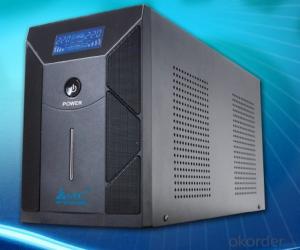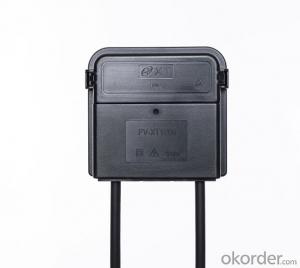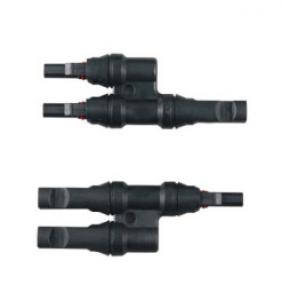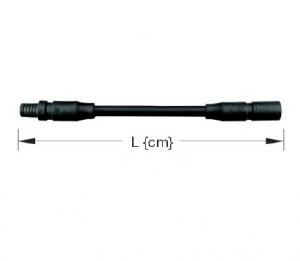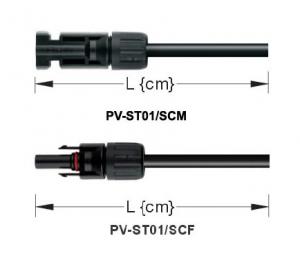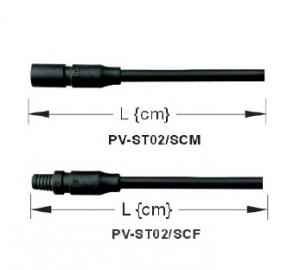Solar Energy Systems Trenton NJ Solar Cable Connector ST01 M F
- Loading Port:
- China Main Port
- Payment Terms:
- TT OR LC
- Min Order Qty:
- -
- Supply Capability:
- 10000 set/month
OKorder Service Pledge
OKorder Financial Service
You Might Also Like
Solar Cable-Connectors,Due to highly robustness,UV-resistance,the touch protection a high grade connection is guaranteed for many years
Rated voltage 1000 V
Rated current 22A
Protection degree(mated,junction box closed/unmated) IP67/IP2X
Operating temperature -40 °c to +85 °c
Contact material Copper,silver plated
Insulation materical PC/PA
Locking system Snap in
- Q: Can solar energy systems be installed on historic buildings?
- Yes, solar energy systems can be installed on historic buildings. However, it is important to consider the sensitivity of the building's preservation and design. Careful planning and collaboration with historic preservation experts are required to ensure that the installation does not compromise the architectural integrity of the historic structure.
- Q: Can solar energy systems be used for powering electric boats or yachts?
- Solar energy systems have the capability to power electric boats or yachts. By installing solar panels on the boat's roof or deck, sunlight can be captured and converted into electricity. This electricity is then utilized to operate the boat's propulsion system and other electrical equipment on board. The popularity of solar-powered electric boats or yachts is increasing due to their environmentally friendly nature and the potential for fuel cost savings. However, the effectiveness of solar power in powering a boat relies on factors such as solar panel size, sunlight availability, and the boat's energy requirements. It is crucial to ensure that the solar energy system is appropriately sized and designed to meet the specific power needs of the boat or yacht. In addition, excess energy generated during peak sunlight hours can be stored in battery storage systems, enabling a continuous power supply even when sunlight is not accessible. Overall, solar energy systems offer a sustainable and renewable power source for electric boats or yachts, decreasing dependency on fossil fuels and minimizing environmental impact.
- Q: Can solar energy systems be used for air purification or water treatment?
- Yes, solar energy systems can be used for air purification or water treatment. The energy generated by solar panels can power various technologies such as air purifiers or water treatment systems, providing a sustainable and renewable solution for these purposes. Solar-powered air purifiers can help remove pollutants from the air, while solar-powered water treatment systems can sanitize and purify water for safe consumption.
- Q: What is the future of solar energy technology?
- The future of solar energy technology looks promising. With advancements in efficiency and cost reduction, solar power is expected to play an increasingly significant role in our energy mix. Continued research and development will likely lead to innovative solutions such as solar panels integrated into building materials and more efficient energy storage systems. Additionally, the integration of solar power with emerging technologies like artificial intelligence and Internet of Things can further enhance its potential. As the world transitions towards cleaner and renewable energy sources, solar energy technology is expected to continue its growth trajectory and contribute significantly to a sustainable and greener future.
- Q: Can solar energy systems be used in powering restaurants or food chains?
- Yes, solar energy systems can definitely be used in powering restaurants or food chains. Solar panels can be installed on the roofs or in open spaces near the establishments to harness sunlight and convert it into electricity. This renewable energy source can power various operations within the restaurants, including lighting, refrigeration, cooking equipment, and HVAC systems, helping to reduce energy costs and carbon emissions. Additionally, the use of solar energy aligns with the sustainability goals of many food chains and can enhance their green reputation.
- Q: Can solar energy systems be used in areas with limited access to solar energy support networks?
- Yes, solar energy systems can still be used in areas with limited access to solar energy support networks. These systems can be designed with battery storage capabilities to store excess energy generated during peak sunlight hours and use it during times when there is limited or no sunlight. This allows for a more reliable and continuous supply of electricity, even in areas with limited solar energy support networks. Additionally, advancements in technology and decreasing costs of solar panels have made them more accessible, making it easier for remote areas to adopt solar energy systems.
- Q: Can solar energy systems be used in areas with limited access to storage solutions?
- Yes, solar energy systems can be used in areas with limited access to storage solutions. While storage solutions like batteries are commonly used to store excess solar energy for use during cloudy or nighttime periods, alternative methods can be employed in areas with limited access to storage solutions. These methods include diverting excess energy to other uses like water heating or pumping, or connecting the solar energy system to the grid to export excess energy and import it when needed. Additionally, advancements in solar technologies and storage solutions are continuously being developed to suit the needs of areas with limited access to storage.
- Q: Can solar energy be used to power my entire home?
- Your entire home can be powered by solar energy. Photovoltaic (PV) panels, also known as solar panels, convert sunlight into electricity. This electricity can then be used to power all the electrical appliances and systems in your home. If you install an adequate number of solar panels on your roof or in your yard, you can generate enough electricity to meet your household's energy requirements. However, the amount of solar energy your home can produce depends on various factors such as the size and orientation of your roof, the amount of sunlight in your area, and your energy consumption habits. To ensure that solar energy can power your entire home, you may need to install a battery storage system. This system will store any excess energy generated during the day for use at night or on cloudy days. Additionally, to maximize the benefits of solar energy and reduce reliance on the grid, you should make energy-efficient choices and decrease your overall energy consumption.
- Q: How do solar energy systems impact the electric utility industry?
- Solar energy systems have a significant impact on the electric utility industry by increasing the supply of renewable energy and reducing the reliance on traditional fossil fuels. This shift towards solar power has prompted utilities to adapt their infrastructure and business models to accommodate distributed generation, such as rooftop solar panels. Additionally, the integration of solar energy into the grid has led to increased grid stability and lowered electricity costs for consumers. However, it has also presented challenges for utilities in terms of managing intermittent power generation and ensuring grid reliability. Overall, solar energy systems are reshaping the electric utility industry towards a more sustainable and decentralized future.
- Q: Can solar energy systems be used in rural areas without access to the grid?
- Solar energy systems are definitely able to be utilized in rural areas that lack access to the grid. In reality, solar power can serve as an ideal solution for off-grid locations as it captures energy from the sun and converts it into electricity without relying on conventional power sources. Sunlight can be captured by installing solar panels on rooftops or in open spaces, which can then be converted into usable electricity through an inverter system. This electricity can be utilized to power a wide range of appliances and devices, providing electricity for lighting, charging mobile phones, operating small appliances, and even powering agricultural equipment or water pumps. Furthermore, any excess energy generated during the day can be stored in batteries for use during nighttime or overcast days. Solar energy systems present a sustainable and dependable electricity source for rural communities, decreasing their reliance on costly and unreliable generators that run on fossil fuels or traditional power grids.
Send your message to us
Solar Energy Systems Trenton NJ Solar Cable Connector ST01 M F
- Loading Port:
- China Main Port
- Payment Terms:
- TT OR LC
- Min Order Qty:
- -
- Supply Capability:
- 10000 set/month
OKorder Service Pledge
OKorder Financial Service
Similar products
Hot products
Hot Searches
Related keywords







